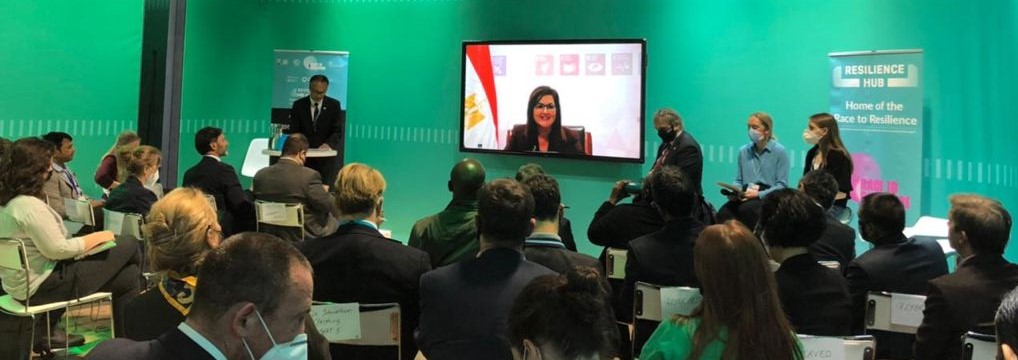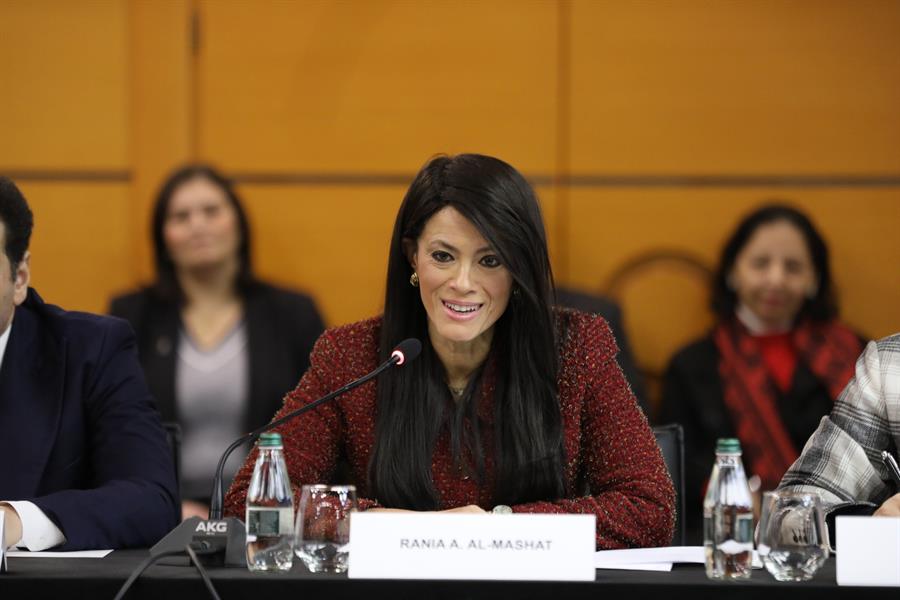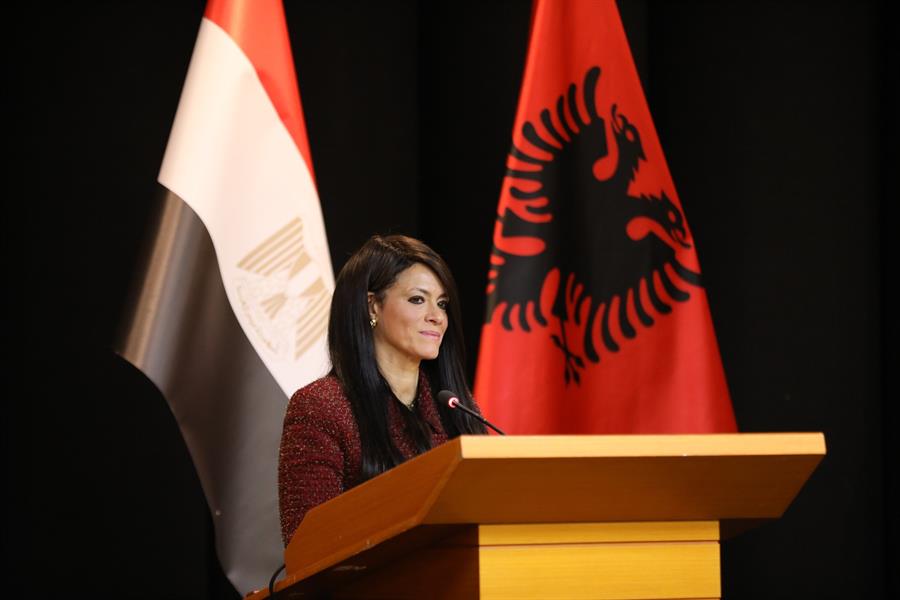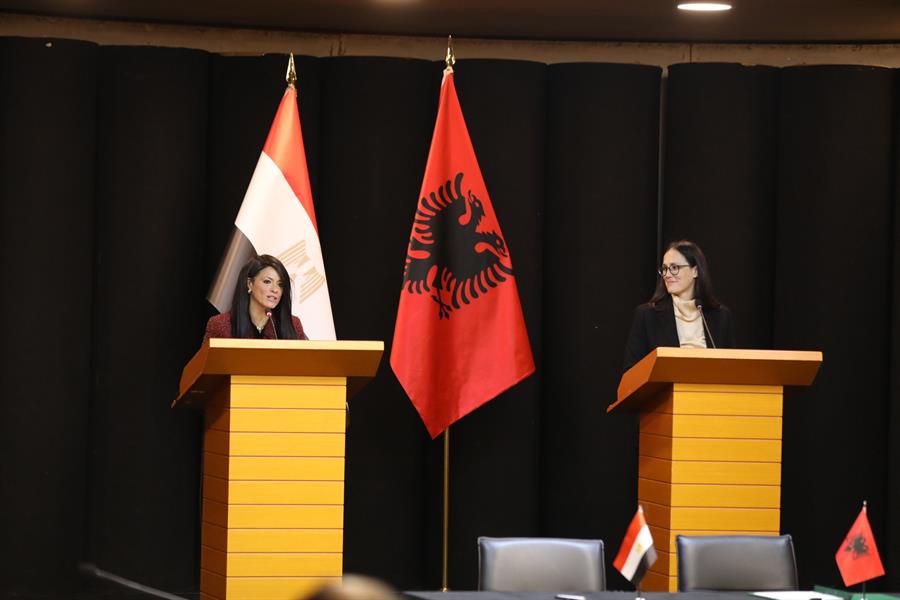The Minister of Planning and Economic Development participates in a panel discussion on "The Effects of Climate Change from a Societal Perspective"

03 November 2021
Climate change and water scarcity are the most important reasons for updating Egypt's Vision 2030: Says Hala El-Said
H.E. Dr . Hala El-Said, Egypt’s Minister of Planning and Economic Development, participated recently via video conference, in the panel discussion held by the Adaptation Action Coalition on “The Impacts of Climate Change from a Societal Perspective”, with the participation of the Executive Director of the International Monetary Fund (IMF), the Director of the United Nations Development Program (UNDP), Director of the Environment and Climate Change Sector at the World Health Organization (WHO). El-Said 's participation came on the sidelines of the 26th Conference of the Parties to Climate Change (CoP26) held in Glasgow, Scotland, which brings together heads of state and climate experts to agree on an action plan to address the effects of climate change.During her participation, El-Said, Minister of Planning and Economic Development reviewed some national efforts regarding development projects, especially the issuance of green bonds because of their direct impact on the phenomena of climate change. El-Said explained that adaptation is a top priority in Egypt, Africa, and the Arab region.El-Said added that despite the smaller contribution to global greenhouse gas emissions, the latest IPCC reports show that Africa and the Middle East, and the North Africa region will continue to suffer impacts beyond their capacity to adapt.
El-Said added that although "water" is not included in the Paris Agreement, it remains a top priority for Egypt and an integral part of combating climate change, which is now having an increasing impact on water security, in addition to the impact of other mega-projects across borders.El-Said explained that such challenges pose significant risks to agriculture and food security, adding that they may reflect hard-earned development gains, as well as being the root causes of the phenomenon of "Climate Change-Induced Migration."El-Said reviewed a number of the state's efforts regarding the policies taken at the national level to respond to the impact of climate change, and mainstream and integrate climate change into the national planning process. El-Said indicated that the Egyptian government is updating its sustainable development strategy (Egypt Vision 2030), to respond to new and emerging challenges, including population growth, climate change, and water scarcity, taking into account regional geopolitical changes and taking into account the effects of the Corona pandemic.El-Said also noted that Egypt launched the second phase of the National Structural Reform Program (NSRP), which includes a large set of radical and well-targeted reforms at the structural and legal levels, to increase the flexibility of the real economy, aiming to achieve balanced, green, and inclusive growth, along with creating more decent jobs.El-Said also touched on the launch of the Ministry of Planning and Economic Development, in cooperation with the Ministry of Environment, in 2020, the "Standards of Environmental Sustainability" guide, to make the investment plan green by following these standards.El-Said explained that 30% of investment projects for the fiscal year 2021/2022 are green projects.El-Said also pointed out that Egypt, as the first country in the Middle East and North Africa region (MENA), launched “Green Bonds” worth $750 million, to finance green projects, especially in the field of clean transportation, adding that the Egyptian private sector is preparing to launch “Special Green Bonds” with a value ranging between $120 -200 million.El-Said added that the government is in the process of launching several strategies to promote the transition towards a green economy, including three national strategies represented in the "National Strategy for Climate Change", the "National Strategy for Hydrogen", in addition to the "National Strategy for Water Resources", as well as a set of "Economic Incentives" to promote green transformation in Egypt.
El-Said also discussed Egypt's efforts to implement several projects to enhance its ability to adapt to climate change, referring to projects to protect the northern coasts from rising sea levels, a project to rehabilitate and cultivate 1.5 million feddans to achieve food security and compensate for land degradation and erosion in the Nile Delta, in addition to a project Rehabilitation and renewal of the national network of water canals for EGP 68.5 billion.El-Said emphasized that all these efforts were carried out using a participatory approach to ensure the effective participation of all relevant stakeholders, including government, the private sector, civil society, researchers, academia, and development partners.On the preparations for the 27th COP, which is scheduled to be held in Egypt and support the significant expansion of adaptation measures at the global level, El-Said explained that it will be held next year in Sharm El-Sheikh, Egypt, explaining that it will be based on the results of the current 26th COP.El-Said continued that activating the global goal of adaptation following Article 7 of the Paris Agreement is a major priority.
El-Said explained that "Financial Instruments" represents an essential element in defining policies and raising the level of ambition, taking into account the levels of external and internal debt in developing countries, including Egypt.El-Said also stressed the importance of developing countries being able to assess their needs and assess the financial gaps, focusing on the main and most vulnerable sectors, and seizing opportunities to meet their challenges.El-Said concluded by explaining the need to address the impact of climate change through an integrated approach that ensures consistency between the global environmental agenda, whether in biodiversity, climate change, or combating desertification.









